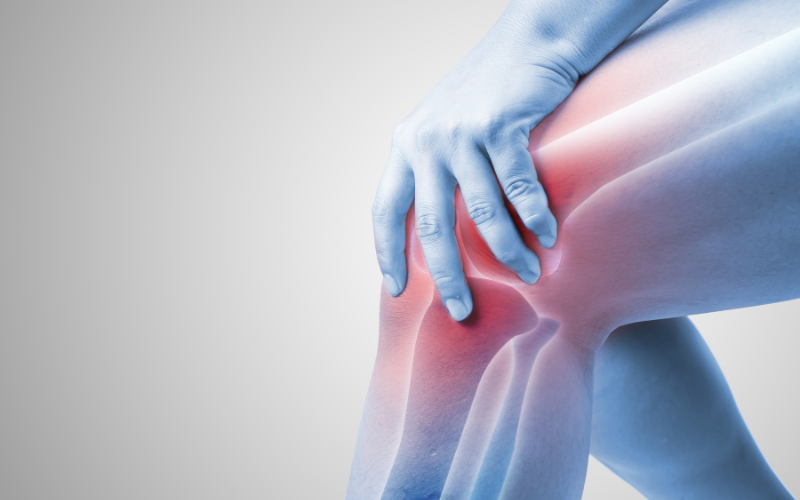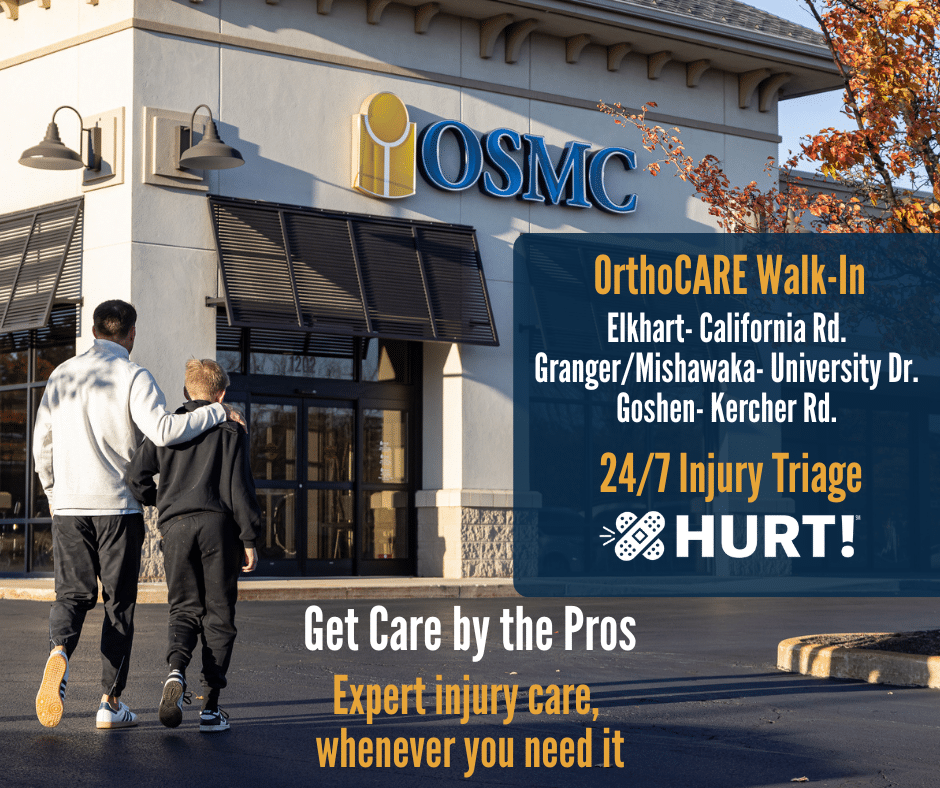Knee Pain Specialist in Michiana
If you experience knee pain, you can sometimes find relief at home with heating pads or light stretching exercises. However, more severe situations (such as acute accidents that destroy tendons and ligaments or significant joint degeneration) require medical care and, in some circumstances, knee surgery.
If you’re experiencing knee pain at least every few days, come to the OSMC Walk-In Clinic and Orthopedic Urgent Care Center.

What is Knee Pain?
Knee pain can be caused by a variety of factors, most typically overuse, trauma, or arthritis. Knee pain can occur at any age, but older people are more prone to acquire knee pain due to joint degradation, often known as osteoarthritis.
Depending on the source of your discomfort; rest, anti-inflammatory medicine, and ice may provide relief. If your damage is more severe, you may require orthopedic treatment or knee surgery.
Knee Pain Treatment
To treat knee injuries such as torn tendons and ligaments, surgeons frequently employ minimally invasive procedures (arthroscopic surgery). These injuries may result in knee instability and discomfort. Your healthcare provider may prescribe knee replacement surgery using robotic-assisted measures if the damage is severe.
Knee Anatomy
The knee is made of:
- Skin
- Muscles
- Bones
- Cartilage – protective lining and shock absorber for the bones
- Meniscus – a type of cartilage to cushion deep in the joint
- Tendons- fibers that connect muscles to bones
- Ligaments- tissues that attach bones to other bones
- Bursa- thin protective pads under the skin
Knee Pain FAQs
What are the Common Causes of Knee Pain?
Overuse
Repetitive activities can lead to pain. Some examples are:
- Patellofemoral pain (runner’s knee): Pain under or around the kneecap, generally due to kneecap mechanics or form
- Osgood-Schlatter disease: The overuse-related swelling of the shinbone beneath the kneecap in children
- Tendonitis: Affecting the quadriceps or patella tendon. Often caused by sports requiring repeated leaping, such as basketball and volleyball
Injury
Sudden trauma can damage parts of your knee joint. Common knee injuries can include:
- Anterior cruciate ligament (ACL) injury or Medial collateral ligament (MCL) injury: Damage to the main stabilizing ligaments of the knee
- Bursitis: Inflammation (swelling) of the fluid-filled sacs that cushion the knee joint
- Kneecap dislocation: Movement out of place by your kneecap (the bone that covers your knee)
- Meniscus tear: Tear in the knee’s cartilage, which is the slippery tissue that helps bones move together smoothly in the joint
Arthritis
Arthritis is a condition that can affect several joints throughout the body. The knee swells when affected by knee arthritis. This is a potentially painful condition. Knee arthritis is more prone to occur with increasing age. There are several different types of arthritis that can affect the knees, including:
- Rheumatoid arthritis: This form of arthritis is an autoimmune illness, meaning it assaults the body’s joints, producing inflammation (swelling) and degeneration
- Osteoarthritis: This kind of arthritis is characterized by a gradual loss of cartilage in the affected joints. Weight plays a significant impact in joint health. Being overweight might put additional strain on the knee. This can be painful. Maintaining a healthy weight via regular exercise and a nutritious diet helps lower the chance of developing joint discomfort
How Can I Manage Knee Pain?
Treatment for knee pain depends on what’s causing it and how uncomfortable it makes you.
- Mild knee injuries often improve with rest, ice, and anti-inflammatory medications
- Wearing a brace can stabilize your knee while it recovers
- If arthritis is causing knee pain, your treatment may include medication and physical therapy
- Doctors can usually repair tendon and ligament tears with minimally invasive surgery, if necessary
- More serious knee pain may require knee replacement surgery
Regardless of the reason for your knee pain, physical therapy exercises can strengthen the muscles that support your knee to alleviate pain.
How Can I Ease Knee Pain at Home?
Your physician or physical therapist may prescribe home care for knee pain relief. Examples include:
- Applying heat or ice packs
- Modifying activities to avoid causing pain
- Practicing gentle stretches or exercises
- Taking over-the-counter pain relievers such as ibuprofen or acetaminophen
- Topical treatments such as muscle creams or rubs
- Wearing a brace to support the knee
When Should I Call the Doctors at OSMC about Knee Pain?
Consult an Orthopedic & Sports Medicine Center physician immediately if you experience significant knee pain following a fall or injury, or if your knee is too painful or unstable to support your weight. Also, consult our physicians if your knee is swollen or you cannot fully extend it. If you experience persistent discomfort for more than a few days, call us at (574) 241-0190.



